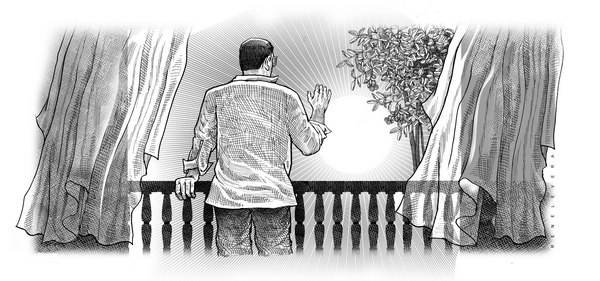
I woke up this morning after a night of rain, which began pouring towards midnight and ended before the first appearance of light, by which time my sleep, fed by the patter of raindrops, had gone into free fall. I had set the alarm of the radio clock to go off at six. A news broadcast made me come round.
Out of habit I sat on the bed, said my morning prayer and made for the outside for some stretching and Tai Chi. When I looked up to tense my neck, a raindrop hanging from a fruit of the Bengal currant shrub that grew in our yard caught my attention. I waited for it to fall, but it just dangled there, a bead of light. I knew that at some time it would drop and splash on the ground. Or, the day promising to reach 40 degrees Celsius, it would vaporise and just vanish from the fruit.
Somehow I thought of the Ascension of Christ. It may seem far-fetched, but for me the evaporation of water suggests Christ’s ascent into heaven—suggests, because I do not see a blow-by-blow correspondence but only the evocations allowed by metaphor. The water that falls as rain does not always stay on the ground but will become gaseous and soar towards the sky and turn into a cloud (only to fall once more, again as rain, at the right time).
Mark describes the Ascension of Christ in a few words—“So then the Lord Jesus, after he spoke to them, was taken up into heaven and took his seat at the right hand of God.”
Jesus had directed his disciples to go out into the world and proclaim his message of salvation to everyone, and to baptize those who would accept it, whose faith would give them the power to drive out demons, speak new languages, and, without being harmed, pick up snakes or drink poisons. Moreover, they could heal the sick by laying their hands on them.
We read in the Acts of the Apostles that, before his Ascension, Jesus told his disciples not to leave Jerusalem and to wait for the “promise of the Father,” the Holy Spirit. Soon after that, “he was lifted up and a cloud took them from their sight.” And then two men in white garments stood beside the disciples and said, “Men of Galilee, why are you standing there looking at the sky? This Jesus who has been taken up from you into heaven will return in the same way as you have seen him going into heaven.”
Many have discussed and debated the cosmology of the Ascension, how the Jews in the time of Christ situated heaven, but the theology remains unquestioned—the Ascension was the departure of Christ from the world into the presence of God. It was Christ’s Exaltation, about which the Creed states: “He ascended into heaven, and is seated at the right hand of God the Father almighty.”
One can use any thing as metaphor for something else for as long as one can establish the points of similarity. Rose easily suggests love or the beloved, for which reason Robert Burns could say, “O my Luve’s like a red, red rose, / That’s newly sprung in June.” The less that two things which get paired have in common, the better the poetry. For instance, Thomas Transtromer uses a tablet as metaphor for a light bulb, two very different things, and succeeds in justifying the comparison. He writes, “They switch off the light and its white shade / glimmers for a moment before dissolving / like a tablet in a glass of darkness.”
I consider water as a metaphor for the Ascension, in that, just as water disappears as vapor and enters a cloud, when Christ ascended a cloud hid him from sight. And unless the water goes up as vapor, the rain will not descend, and there will be no nourishment for the fields and the crops. So also, unless Jesus ascended, the Holy Spirit, the Promise of the Father, would not come down to sanctify the world.
Hence, in the Mass, the priest invokes the Holy Spirit to descend like the dew, whose soaking action is imperceptible and certain— “Make holy, therefore, these gifts, we pray, by sending down your Spirit upon them like the dewfall”—as he extends his hands over the bread and wine. He asks the Heavenly Father to send the Holy Spirit down upon them, so that they may become the body and blood of the Lord Jesus Christ, which shall be our nourishment.
I recall what God said through Hosea: “I will heal their defection, I will love them freely; for my wrath is turned away from them. I will be like the dew for Israel: He shall blossom like the lily.”